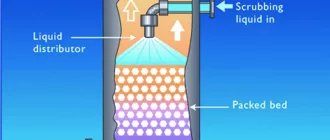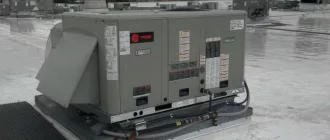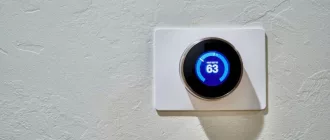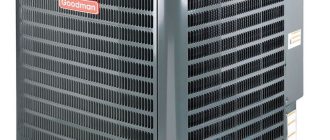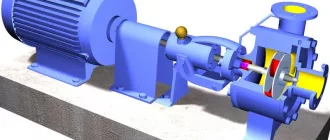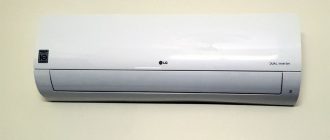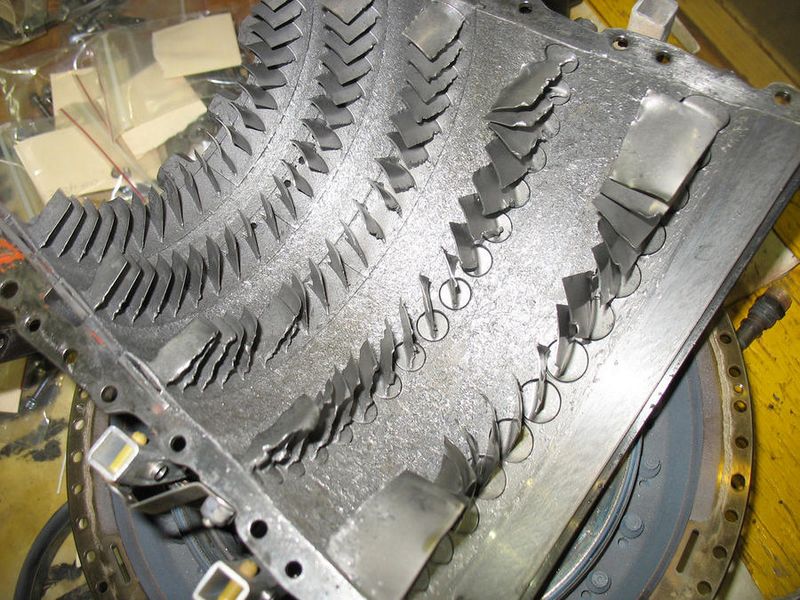
What can damage AC compressor?
The compressor is a crucial component of an air conditioning (AC) system, responsible for pressurizing and circulating refrigerant. However, various factors can lead to compressor damage, resulting in costly repairs or even the need for a complete replacement. Understanding the common culprits behind compressor damage is essential for both homeowners and HVAC professionals alike.
One of the most common causes of compressor damage is leakage. Over time, seals can wear out or become damaged, allowing refrigerant to escape. This leakage not only reduces the efficiency of the AC system but also puts additional strain on the compressor, leading to overheating and potential damage.
Another culprit is friction. When the AC system is not properly lubricated, the compressor’s moving parts can generate excessive friction. This friction causes the compressor to overheat, and if left unaddressed, can ultimately lead to its failure.
In some cases, the compressor may seize due to lack of maintenance or a faulty electrical connection. A seized compressor can result in the entire AC system shutting down and may even cause a rupture in the refrigerant lines.
To prevent compressor damage, regular maintenance is crucial. This includes checking and replacing seals, ensuring proper lubrication, and inspecting electrical connections. Additionally, it is important to address any issues with refrigerant levels promptly and avoid overworking the AC system by setting the thermostat to a reasonable temperature.
By understanding the common causes of compressor damage and taking proactive measures to prevent them, homeowners can extend the lifespan of their AC system and avoid costly repairs. Regular maintenance and prompt attention to any signs of compressor damage are key to keeping your AC system running smoothly and efficiently.
Causes of AC Compressor Damage:
AC compressors are a vital component of air conditioning systems, responsible for pressurizing refrigerant and circulating it through the system. Unfortunately, there are several common culprits that can cause damage to the AC compressor, leading to costly repairs or even the need for a complete replacement.
One of the most common causes of AC compressor damage is a rupture in the compressor itself. This can occur due to a variety of reasons, such as excessive pressure or debris in the system. When a rupture occurs, the compressor will fail to properly pressurize the refrigerant, resulting in a loss of cooling power.
Another common cause of AC compressor damage is seizure. This happens when the moving parts of the compressor become stuck or frozen, preventing proper operation. Seizure can occur due to a lack of lubrication or excessive friction within the compressor.
Failure to properly maintain the AC compressor can also lead to damage. Over time, debris can accumulate within the compressor, causing it to overheat and potentially fail. Regular cleaning and maintenance can help prevent this type of damage.
In some cases, AC compressor damage can be caused by external factors. For example, if the AC unit is installed in an area with poor ventilation or excessive heat, the compressor may overheat and become damaged. Similarly, if the AC system is exposed to extreme weather conditions, such as freezing temperatures, the compressor may suffer damage.
It is important to be aware of the potential causes of AC compressor damage and take steps to prevent them. Regular maintenance, including cleaning, lubrication, and checking for leaks or debris, can help prolong the life of the compressor. Additionally, ensuring proper ventilation and protecting the AC unit from extreme temperatures can also help prevent damage.
In conclusion, AC compressor damage can be caused by ruptures, failures, seizures, and other factors that result in damage to the compressor. Regular maintenance and taking preventive measures can help avoid costly repairs and prolong the life of the AC system.
Common Causes of AC Compressor Damage
AC compressors can become damaged due to several common causes, including:
- Excessive Friction: When the compressor’s moving parts experience increased friction, it can lead to wear and tear over time. This can cause the compressor to seize up and fail.
- Overheating: AC compressors can overheat if they are run for extended periods without proper ventilation or if they are exposed to extremely high ambient temperatures. Overheating can cause the compressor to break down and ultimately fail.
- Refrigerant Leak: If the AC system develops a refrigerant leak, it can cause the compressor to work harder to maintain proper cooling. This increased workload can lead to damage and eventual failure.
- Rupture: If there is a rupture or leakage in the compressor’s internal components, it can lead to damage and prevent the compressor from functioning properly.
- Poor Maintenance: Lack of regular maintenance, such as failing to clean or replace air filters, can result in reduced airflow and increased strain on the compressor, leading to damage over time.
It’s important to address these issues promptly to prevent further damage to the AC compressor and ensure the longevity of the cooling system.
Potential Culprits of AC Compressor Damage
There are several potential culprits that can lead to AC compressor damage. Understanding these common causes can help you take preventative measures and prolong the life of your AC system.
- Overheating: AC compressors can overheat due to a variety of reasons, such as insufficient lubrication, dirty condenser coils, or electrical issues. When the compressor overheats, it can lead to damage and eventually cause it to fail.
- Rupture: If there is a flaw or weakness in the compressor, it can rupture under high pressure. This can be caused by manufacturing defects or excessive wear and tear over time.
- Leakage: Refrigerant leakage is a common problem in AC systems. When refrigerant levels are low, the compressor has to work harder to maintain the desired temperatures. This additional stress can lead to compressor damage.
- Friction: Excessive friction within the compressor can cause damage to its internal components. This can be due to lack of lubrication or worn-out bearings, pistons, or valves. Regular maintenance and lubrication can help prevent this issue.
By understanding these potential culprits of AC compressor damage, you can take proactive steps to prevent them and ensure the longevity of your AC system. Regular maintenance, proper lubrication, and timely repairs can go a long way in avoiding compressor failure and costly repairs.
Faulty Electrical Components
One common cause of AC compressor damage is faulty electrical components. Electrical issues can lead to the compressor overheating, seizing, or rupturing, resulting in costly repairs or even the need for a replacement.
When there is a problem with the electrical components, such as a faulty capacitor or wiring, it can cause the compressor to work harder and longer than necessary. This increased strain on the compressor can lead to overheating, which can then cause the compressor to seize or rupture.
In addition, faulty electrical components can also cause leakage or damage to the compressor oil, which is essential for lubrication. Without proper lubrication, the compressor can experience increased friction, leading to premature failure.
To prevent these issues, it is important to regularly inspect and maintain the electrical components of your AC system. This includes checking for loose or damaged wires, ensuring that capacitors are functioning properly, and addressing any issues promptly.
Regular maintenance by a qualified technician can help identify and resolve any electrical issues before they cause significant damage to your AC compressor. Taking proactive measures to ensure the proper functioning of the electrical components can extend the lifespan of your compressor and prevent costly repairs or replacements.
Lack of Lubrication
One of the common causes of AC compressor damage is the lack of lubrication. Without proper lubrication, the compressor can fail to function properly, leading to various issues.
Lubrication is essential for reducing friction within the AC compressor. The compressor relies on a lubricant to create a thin film between moving parts, which helps to minimize wear and tear.
When there is a lack of lubrication, the compressor can overheat due to increased friction. This can result in damage to the compressor, causing it to seize or fail completely.
Lack of lubrication can occur due to various reasons, such as leaks in the refrigerant system. Refrigerant leakage can lead to a loss of lubricant, leaving the compressor vulnerable to damage.
To prevent AC compressor damage from lack of lubrication, regular maintenance and inspection are crucial. It is important to check for any leaks and ensure that the refrigerant system is properly sealed to prevent lubricant loss.
In addition, it is important to regularly check and replace the compressor’s oil to ensure proper lubrication. This will help to extend the lifespan of the compressor and prevent potential damage.
In conclusion, lack of lubrication can lead to serious damage to the AC compressor. Regular maintenance and monitoring of the refrigerant system are essential to prevent issues related to lubrication and ensure the proper functioning of the AC system.
Dirty or Clogged Air Filters
One common culprit of AC compressor damage is dirty or clogged air filters. When the air filters are dirty or clogged, they can restrict the airflow and reduce the efficiency of the AC system. This can put added strain on the compressor, causing it to seize or fail.
When the air filters are dirty, the compressor has to work harder to push air through the system. This increased workload can lead to excessive friction and overheat the compressor, potentially causing it to fail. Additionally, dirt and debris from the dirty filters can enter the compressor and cause internal damage.
Air filters should be regularly checked and cleaned or replaced as needed to prevent compressor damage. Regular maintenance and cleaning of the air filters can also improve the efficiency of the AC system and prevent other issues such as leakage or rupture in the compressor.
It is important to note that different AC systems may have different types of air filters, and the specific maintenance requirements may vary. It is recommended to consult the manufacturer’s guidelines or seek professional assistance for proper maintenance of your AC system.
Insufficient Refrigerant Levels
Insufficient refrigerant levels in an AC system can cause significant damage to the compressor. The compressor relies on refrigerant to operate efficiently and cool the air. When the refrigerant levels are low, several problems can occur:
| Rupture | Low refrigerant levels can cause the compressor to work harder, leading to increased pressure within the system. This excessive pressure can cause the compressor to rupture, resulting in severe damage. |
| Compressor Damage | Insufficient refrigerant can cause the compressor to overheat. This overheating can damage the internal components of the compressor, including the motor, coils, and valves, resulting in compressor failure. |
| Seize | Low refrigerant levels can also cause the compressor to seize. When the compressor seizes, it becomes immovable, preventing the AC system from functioning properly. |
| Friction and Overheat | Inadequate refrigerant can lead to increased friction between moving parts within the compressor. This friction can cause the compressor to overheat, resulting in damage to the compressor and the surrounding components. |
| Leakage | If the refrigerant levels are consistently low, it may indicate a refrigerant leak in the system. A refrigerant leak can cause further damage to the compressor and requires immediate attention to prevent further issues. |
To prevent insufficient refrigerant levels and the resultant damage to the AC compressor, regular maintenance is crucial. This includes checking the refrigerant levels and ensuring there are no leaks in the system. If any issues are detected, it is important to address them promptly to avoid costly repairs or compressor replacement.
Improper Installation or Maintenance
Improper installation or maintenance of an AC compressor can lead to significant damage and potential failure. It is important to ensure that the compressor is installed correctly and that regular maintenance is performed to avoid these issues.
Damage to the compressor can occur if it is not securely and properly installed. Improper installation may cause the compressor to vibrate excessively, leading to internal damage and a decrease in efficiency. Over time, this can cause the compressor to overheat and eventually fail.
In addition to installation, regular maintenance is crucial for the proper functioning of the AC compressor. Lack of maintenance, including neglecting to clean or replace the air filters, can cause the compressor to work harder and experience increased friction. This can lead to the compressor seizing up and potentially failing.
Another common issue resulting from improper maintenance is compressor damage due to refrigerant leakage. If the refrigerant levels are not regularly checked and replenished, the compressor can be subjected to excessive strain. This strain can cause the compressor to overheat and ultimately rupture, leading to a complete breakdown.
Proper installation and regular maintenance are vital for ensuring the longevity and efficiency of an AC compressor. It is essential to follow manufacturer guidelines and seek professional help when needed to prevent damage, overheat, friction, seize, compressor failure, rupture, and refrigerant leakage.
Corrosion and Rust
Corrosion and rust are common culprits that can cause damage to AC compressors. When the compressor is exposed to moisture, corrosion can occur, leading to the formation of rust. Rust can weaken the structural integrity of the compressor and compromise its performance.
Corrosion and rust can result in a variety of issues. Firstly, they can lead to overheating of the compressor. As corrosion and rust build up, the compressor may struggle to dissipate heat effectively, causing it to overheat. An overheated compressor can fail prematurely and require costly repairs or replacement.
In addition, corrosion and rust can cause friction within the compressor. As the surfaces of the compressor components corrode and rust, they may not move as smoothly as they should. This increased friction can put strain on the compressor, leading to reduced efficiency and potential damage.
Furthermore, corrosion and rust can contribute to compressor failure due to leakage. When rust forms on the compressor’s metal surfaces, it can create small holes or cracks where refrigerant can escape. This refrigerant leakage can cause the AC system to lose cooling capacity and eventually lead to the compressor seizing up.
To prevent corrosion and rust damage, it is important to keep the AC compressor clean and dry. Regular maintenance, such as cleaning the compressor and inspecting for any signs of rust or corrosion, can help identify and address issues before they worsen. Additionally, keeping the compressor protected from moisture by using a cover or ensuring it is installed in a dry and well-ventilated area can help minimize the risk of corrosion.
In conclusion, corrosion and rust can cause significant damage to AC compressors. It is crucial to take preventive measures to avoid the detrimental effects of corrosion, such as overheating, friction, compressor failure, and refrigerant leakage. By ensuring regular maintenance and protecting the compressor from moisture, it is possible to maintain the performance and longevity of the AC system.
Extreme Temperature Fluctuations
One of the common culprits of AC compressor damage is extreme temperature fluctuations. When subjected to rapid and excessive temperature changes, the compressor may suffer severe damage that can shorten its lifespan or even cause it to fail completely.
Extreme temperature fluctuations can cause a variety of issues with the AC compressor. One of the most common problems is thermal expansion and contraction of the compressor components. As temperatures fluctuate, the metal parts of the compressor expand and contract. Over time, this repetitive movement can lead to fatigue and stress on the components, increasing the risk of damage or failure.
In addition to thermal stress, extreme temperature fluctuations can also affect the lubrication of the compressor. If the compressor is exposed to excessively high temperatures, the oil inside it can overheat and break down, resulting in inadequate lubrication. This can cause the compressor to seize or overheat, leading to further damage or even rupture.
Similarly, rapid temperature changes can also cause the refrigerant inside the compressor to undergo significant pressure changes. This can lead to refrigerant leakage and compromise the efficiency and performance of the AC system. In extreme cases, the compressor may even rupture due to the excessive pressure.
To prevent damage from extreme temperature fluctuations, it is important to ensure that the AC system is properly sized and installed. The system should be designed to handle the temperature fluctuations in the local climate. Regular maintenance, including cleaning and changing the air filters, can also help to prevent overheating and stress on the compressor. Additionally, homeowners should avoid sudden temperature changes and fluctuations by maintaining a stable indoor temperature and avoiding large temperature adjustments.
By taking these preventative measures, homeowners can minimize the risk of AC compressor damage due to extreme temperature fluctuations, prolonging the life of their AC system and avoiding costly repairs or replacements.
High Pressure or Low Pressure
High pressure or low pressure can lead to serious damage and failure in an AC compressor. Both these conditions can occur due to various reasons and can cause significant issues if not addressed in a timely manner.
Excessively high pressure can result from factors such as a clogged condenser coil, a malfunctioning expansion valve, or a faulty fan. When the pressure in the compressor becomes too high, it can cause damage to the internal components, leading to leakage, friction, and even rupture. This can result in the compressor overheating and ultimately failing.
On the other hand, low pressure can also be detrimental to the compressor’s functionality. It can occur due to a refrigerant leak, a faulty pressure switch, or insufficient airflow. When the pressure drops below the recommended levels, the compressor may not receive enough lubrication and cooling, leading to overheat and seize. This can cause significant damage to the compressor and ultimately result in its failure.
To prevent damage caused by high pressure or low pressure, regular maintenance is crucial. It is important to ensure that the condenser coil is clean, the expansion valve is functioning properly, and the fan is in good working condition. Additionally, checking for refrigerant leaks and maintaining sufficient airflow can help prevent low pressure conditions. Regular servicing and inspections by a trained professional can help identify and address any potential issues before they escalate and cause serious damage to the compressor.
In conclusion, both high pressure and low pressure can have detrimental effects on an AC compressor. It is essential to identify and address the underlying causes of these pressure abnormalities to prevent damage, leakage, friction, rupture, overheating, seized, and ultimately compressor failure.
Overworking the AC System
One of the common causes of AC compressor damage is overworking the AC system. This can occur when the AC unit is run continuously for extended periods without proper maintenance or adequate rest periods. Overworking the AC system puts stress on the components and can lead to various issues.
One of the primary problems caused by overworking the AC system is damage to the compressor. The compressor plays a crucial role in the cooling process, as it pressurizes the refrigerant and circulates it through the system. Continuous operation without rest can cause the compressor to overheat, resulting in damage and potential failure.
Leakage is another issue that can arise from overworking the AC system. The constant stress and strain on the components can cause connections to become loose or seals to deteriorate, leading to refrigerant leaks. Refrigerant leakage not only reduces the cooling efficiency but can also cause damage to the compressor if it runs low on refrigerant.
Friction is also a common problem associated with overworking the AC system. As the AC unit operates continuously, the various moving parts can experience increased friction due to the constant movement and lack of rest. This can lead to excessive wear and tear, causing components to seize or fail prematurely, including the compressor.
Overworking the AC system can also result in the rupture of the compressor. The excessive strain on the compressor can cause it to reach its breaking point, leading to a rupture. A ruptured compressor not only requires costly repairs or replacement but can also damage other components in the process.
To prevent damage caused by overworking the AC system, it is advisable to follow a few maintenance practices. Regularly schedule maintenance checks and provide the AC unit with proper rest periods to avoid excessive operation. Additionally, ensure that the AC system is properly sized for the space it is intended to cool, as an oversized unit may be prone to overworking. Regularly inspect and maintain the components, including connections and seals, to prevent leakage and minimize friction.
By taking these preventive measures, you can help prolong the life of your AC compressor and avoid potential damage caused by overworking the AC system.
Age and Wear
Age and wear are major factors that can cause an AC compressor to fail and lead to extensive damage. Over time, the constant use and exposure to varying weather conditions can take a toll on the compressor’s components.
The most common issue that arises with age and wear is leakage of refrigerant. As the compressor gets older, the seals and gaskets may start to deteriorate, causing the refrigerant to escape. This not only reduces the efficiency of the AC system but also puts additional strain on the compressor, leading to potential damage.
Another problem associated with age and wear is the tendency for the compressor to seize. This can occur due to a lack of regular maintenance or the buildup of dirt and debris in the system. As the compressor ages, its internal components may become worn or damaged, leading to increased friction and eventual seizure.
Friction is a common issue that arises from age and wear, as the moving parts of the compressor rub against each other over time. This friction can cause damage to the compressor’s pistons, valves, and other components, leading to decreased efficiency and potential failure.
Additionally, the internal pressure of the AC compressor can increase with age, putting additional strain on the system. The increased pressure can lead to a rupture or other forms of compressor damage.
To prevent age and wear-related issues, regular maintenance is crucial. This includes cleaning or replacing air filters, checking refrigerant levels, and ensuring proper lubrication of the compressor. Regular inspections can help catch any signs of wear or damage early on, allowing for necessary repairs or replacements to be made before further issues occur.
How to Prevent AC Compressor Damage
Regular maintenance and proper usage can help prevent damage to your AC compressor. Here are some important preventive measures:
- Keep the compressor clean: Regularly clean the exterior of the compressor to avoid dust and debris buildup. This can help prevent damage due to overheating.
- Check for refrigerant leakage: Inspect the compressor and refrigerant lines for any signs of leakage. Promptly repair any leaks to prevent damage caused by low refrigerant levels.
- Provide proper lubrication: Ensure that the compressor is adequately lubricated to reduce friction between moving parts. Follow manufacturer guidelines for lubrication and use only recommended oils.
- Prevent excessive pressure: Regularly inspect the AC system to ensure that the pressure levels are within the recommended range. High pressure can cause the compressor to overheat and fail.
- Maintain proper airflow: Ensure that there are no obstructions to the airflow around the compressor. Good airflow helps prevent overheating and compressor failure.
- Avoid overworking the compressor: Avoid setting the thermostat at extreme temperatures or constantly running the AC system at maximum capacity. Overworking the compressor can lead to its premature failure.
- Have regular professional inspections: Schedule regular inspections and maintenance with a qualified HVAC technician. They can identify and address any potential issues before they cause severe damage to the compressor.
- Replace worn-out parts: Timely replacement of worn-out components, such as belts and filters, can prevent strain on the compressor and reduce the risk of rupture or seizure.
By following these preventive measures, you can help prolong the lifespan of your AC compressor and reduce the risk of costly repairs or replacements.
Q&A:
What are the common causes of AC compressor damage?
The common causes of AC compressor damage include improper installation, lack of maintenance, electrical problems, refrigerant leaks, and dirty or clogged air filters.
How can improper installation lead to AC compressor damage?
Improper installation can lead to AC compressor damage because it can result in incorrect refrigerant levels, poor airflow, or electrical issues, ultimately putting strain on the compressor and causing it to fail.
What are some ways to prevent AC compressor damage?
Some ways to prevent AC compressor damage include having the unit professionally installed, scheduling regular maintenance, checking and changing air filters regularly, addressing electrical issues promptly, and fixing refrigerant leaks in a timely manner.
How does lack of maintenance contribute to AC compressor damage?
Lack of maintenance can contribute to AC compressor damage because it allows dirt and debris to build up, reducing airflow and causing the compressor to overheat. It also allows small issues to go unnoticed and become bigger problems over time.
Can dirty air filters cause AC compressor damage?
Yes, dirty air filters can cause AC compressor damage. When filters are dirty or clogged, they restrict airflow to the unit and cause it to work harder, potentially leading to compressor failure.
How does a dirty air filter cause AC compressor damage?
A dirty air filter can cause AC compressor damage by restricting airflow to the system, which can cause the compressor to overheat. This can lead to the compressor becoming damaged or failing altogether.
What are some signs that the AC compressor is damaged?
Some signs that the AC compressor is damaged include strange noises coming from the unit, reduced cooling efficiency, leaks near the compressor, and the compressor not turning on at all. If you notice any of these signs, it is important to have the compressor checked by a professional to prevent further damage.

